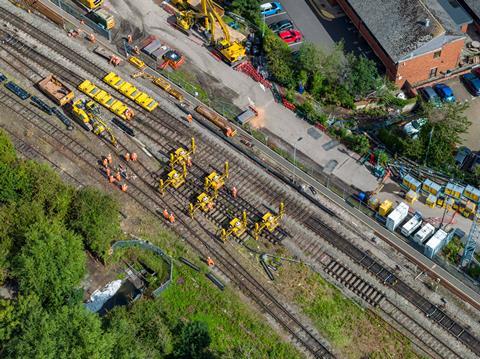
UK: The Office of Rail & Road has published its final determination setting out how Network Rail plans to use the £43·1bn being made available to fund infrastructure operation, maintenance and renewal during the five-year Control Period 7 starting on April 1 2024.
Network Rail has revised its plans since ORR’s draft determination in June, increasing the proposed spending on core infrastructure by £600m.
The final determination issued on October 31 is the culmination of a three-year review process. It covers the spending of £38·5bn in England & Wales, and £4·6bn in Scotland. Enhancement projects such as new lines and electrification are not included, as these are now being funded separately on a case-by-case basis.
‘The plans are challenging but achievable’, said ORR’s Director, Economics, Finance & Markets, Will Godfrey. ‘Our five-year funding and regulatory settlement provides stability and a platform for the industry to plan and invest. This is important not just for Network Rail, but also for passenger and freight operators and the supply chain.’
Train performance
Performance targets for CP7 are more challenging than originally proposed by Network Rail. They will require the infrastructure manager to work with train operators to ensure that cancellations are reduced and punctuality maintained as passenger numbers increase.
ORR said it recognised the challenges to forecasting performance accurately, and so it would reassess the passenger performance targets for England & Wales in advance of year three of CP7. This would offer an opportunity for train operators to work with Network Rail to better align their planning processes.
Freight
ORR says it has set ‘appropriately challenging’ targets for freight, with Network Rail required to reduce cancellations.
The regulator has set freight growth targets across Great Britain for the first time, of 7·5% in England & Wales and 8·7% in Scotland.
ORR will also continue to cap track access charges for freight operators below cost.
Renewals
Network Rail is expected to increase spending on renewing core assets such as track, structures and earthworks, in order to address ORR’s concerns expressed in its draft determination and to bolster asset sustainability, safety and performance. ORR said this was ‘particularly important with the challenges presented by climate change’; spending on climate change adaptation and mitigation will increase to £2·2bn for CP7, compared to £1bn in CP6.
ORR considers that Network Rail has a suitable framework to manage the change in risk from carrying out fewer renewals and focusing more on the maintenance of existing assets.
Managing risk
ORR said significant uncertainty had shaped the development of the plan, including inflation and climate change.
Network Rail is required to make provisions for risk funding of £1·5bn in England & Wales and £225m in Scotland.
Value for money
ORR said it recognised the ‘tight fiscal context’ facing the UK rail sector, adding that it was vital for Network Rail to build on recent efficiency initiatives and deliver value for money for passengers, freight and funders.
The ‘stretching but achievable’ efficiency targets would see Network Rail deliver efficiencies of at least £3·2bn in England & Wales and £0·4bn in Scotland.
Network Rail said there was still much work to be done to identify the details of how this could be achieved, which would involve technology, supplier engagement, innovation and ‘smarter’ ways of working.
Environment
ORR requires Network Rail to deliver a reduction of more than 20% in its carbon emissions, and has also set a target for it to ‘conserve and enhance’ biodiversity.
Next steps
Network Rail will now review the detail of the final determination, and continue to develop its detailed CP7 delivery plan by the end of March 2024.
‘The rail sector enjoys an almost unique level of funding certainty and that is a privilege that comes with serious responsibilities’, said Network Rail CEO Andrew Haines, adding that the determination ‘gives clarity and certainty for the railway and our supply chain partners’.
He recognised that ‘the impact of inflation, tight public finances and the need to invest more to manage the impact of more frequent extreme weather on the infrastructure does mean that our funding will need to go further than ever before’.
Responses
The Scottish government’s Minister for Transport Fiona Hyslop said ‘Scottish Ministers are now far more confident that Network Rail has successfully reduced the increase in its central costs and any cost allocations to Scotland are only for those projects that will benefit Scotland’.
Railway Industry Association Policy Director Robert Cook said ‘whilst RIA welcomes the funding for CP7 we recognise that there are inflationary pressures and this means the settlement will go less far. As set out in the Department for Transport’s High Level Output Specification Network Rail now needs to work closely with suppliers to ensure efficient delivery and a smooth and visible pipeline of work.’
John Thomas, Director of Policy at Rail Partners, said ’while ORR has listened to industry concerns in some areas, given the importance of performance to passenger and freight customers, we are disappointed to see that CP7 performance trajectories have been softened from those set out earlier this year in the draft determination. The regulator must hold Network Rail to account to ensure the efficient delivery of infrastructure maintenance and renewals, that performance targets are met, and that we rise to the challenge of extreme weather resulting from climate change’.



